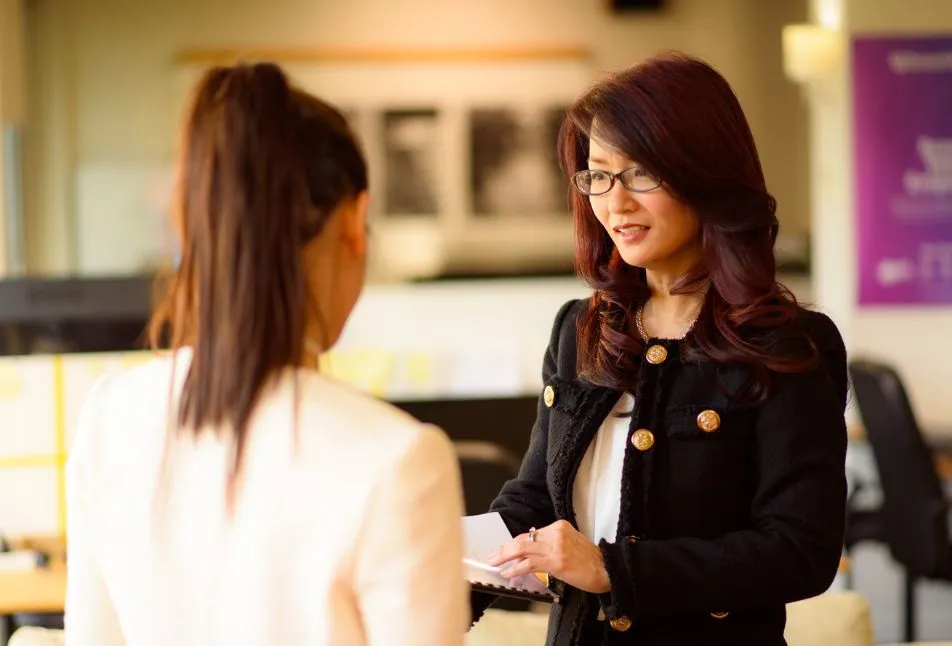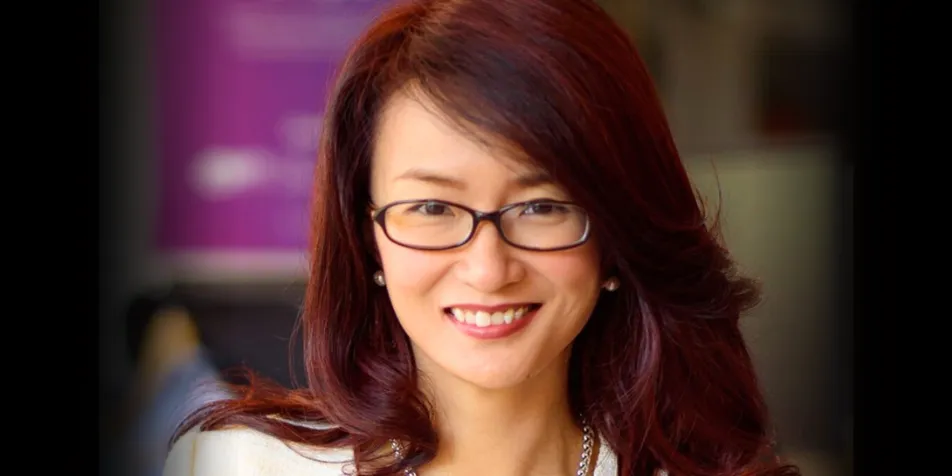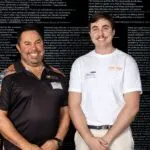Dr Sandy Chong.
Author | Carmelle Wilkinson
Philanthropist, businesswoman and educator Dr Sandy Chong is a global changemaker on a mission.
Armed with a passion for education and dreams of equality, the Curtin Bachelor of Commerce in Management and Marketing and PhD Information Systems graduate, is making meaningful impact as a climate crusader and lead strategist.
Through her business and philanthropic ventures, Sandy is a formidable force, campaigning for change and paving the way for a better tomorrow.
Born in Singapore, she migrated to Australia in 1995 with optimism and hope.
“I was fortunate to have a great father. He always encouraged me to strive for the best. But I knew deep down at the time that the options for my life were very limited if I stayed in Singapore,’’ she said.
“Growing up in Singapore, I had to work really hard to get scholarships at every stage of schooling to continue my primary and secondary studies.
“I was very fortunate, because I had girlfriends from high school whose families could only afford to send one child to university, and they would send the brothers instead.
“These stories have always stayed with me, and I feel extremely fortunate to have been able to come to this country and be afforded an education.”

Sandy said an education allowed her to become a changemaker.
Today, Sandy is founder of Verity Consulting, an award-winning consultancy specialising in international growth and strategic communication and uses her voice and leadership expertise on various boards to champion sustainability and embrace diversity and equality.
Winner of Asia’s Top Sustainability Woman of the Year Award, Sandy also enjoys sharing her knowledge with young people through her promotion of the United Nations Sustainable Development Goals (SDGs) in her capacity as President of the UN Association of WA.
“When it all comes down to it, our planet is everyone’s responsibility, no matter your situation,’’ she said.
“I think it’s naive to think that we are in one boat, and as long as our boat is afloat, everything be fine.
“We’re all in the same boat, whether you’re from Africa, Asia or Australia. And we need to work together to protect our future.”
As Asia’s Top Sustainability Woman of the Year, what responsibility do you feel personally in advocating for change and creating global impact?

Sandy at a UN conference in Geneva.
I do my best to help the WA state and local governments promote the values of the SDGs.
I’m most proud of the fact that we have also now gone beyond the activism space and into the public and private sectors successfully in the last three years.
Currently, we are engaging with organisations like BHP, Synergy and superannuation companies and even sporting organisations like the West Coast Eagles and Special Olympics Australia, to raise awareness of the UN SDG goals.
We say to them, “look, we need to make a better impact in the world and we need to start defining what leadership should look like in the business sector.”
Australia is at this interesting crossroads right now. We can already see how some countries are leading in terms of SDG ranking when it comes to closing the gap in equality, addressing climate change or providing opportunities for less fortunate communities.
We just need to continue doing more so we that can meet the SDG targets by 2030.
Things are changing. It’s a bit slow and of course we were all set back by the COVID crisis, but therein lies an opportunity too.
We are a lot more sensitive now about the environment, mental health and the disparity between the wealthy and less privileged.
As leaders, it is incumbent on us to actually do something to close these gaps.
Curtin’s new degree – Planet Positive, will equip students with the necessary skills to positively drive change in their future careers. Why is it important to upscale skills in sustainability?

Sandy encourages students to upscale their skills and get involved in the climate conversation.
Education is the silver bullet which can lead to greater understanding and knowledge.
It’s essential to upscale our skills in this space, because if you don’t pivot, you might be out of a job.
The benefits of initiatives like Planet Positive on our youth and ultimately our world is huge.
For one, the youth nowadays are much more aware and a lot more educated about sustainability, peace, and equality than my generation. And they want it, they’re hungry for it.
I think it’s essential that our future generation and future leaders are fully equipped to make responsible business decisions.
I also think it’s important to empower them and encourage them, to have access to these tools so that when they do go into the industry, they know how to contribute to society.
We have this responsibility as educators of not just educating our young people but giving them inspiration.
Allowing them to stretch their imagination and come out with solutions that will impact the world.
It’s wonderful that Curtin is leading the way and equipping our young people with the skills they need to transition into the next economy.
In your experience as an educator and businesswoman, how have climate change conversations changed over the past few years?
While it may be a slow burn, we are definitely a lot more sensitive now to climate change, than ever before.
Yes, there is still some climate denial, but it’s becoming harder and harder to ignore, especially when it’s happening in our own backyard.
Long droughts, terrible bushfires and unexpected rainfall and flooding, are destroying our crops and affecting lives.
Covid was a reset.
A reset for the earth and for people and we are starting to really appreciate what we have around us.
It’s not going to be there forever if we don’t protect it.
Nature needs time to rest, and nature needs us to conserve it.

Sandy believes change happens when everyone comes together to find solutions.
Was there a particular moment of clarity in your life when you decided to become a sustainability and equality champion?
I think there were many moments to be honest.
There’s been a series of things happening in my life that got me really interested.
Firstly, living in many different countries like Japan and Germany in my early adult life had great impact.
It was fascinating to see how the Germans and Europeans were very aware of environment protection since the 80s and 90s.
And the way the Japanese live their lives, in regard to making sure that nothing is wasted, and everything is clean and efficient really inspired me.
I also think growing up in Asia with grandparents who were not wealthy and who experienced war gave me a different perspective.
They were not wasteful. Nothing got tossed away and if something broke, they would repair it, instead of buying a replacement.
About 15 years ago I attended a friend’s wedding in Thailand on the same island made famous by the movie The Beach and I was horrified with what I saw.
The beautiful cove was packed with petrol boats and there were about 50 metres of plastic bottles floating offshore, it was shocking.
As someone who juggles quite a lot on their plate, what inspires and motivates you to give so generously of your time?

Sandy as a young child with her father in Singapore.
As a military man, my father educated me at a very young age to give back.
He always wanted me to serve as a politician, but I truly didn’t have the stomach or inclination for it.
Having said that, I have always been interested in politics and understanding history.
I like looking at how countries work together, and I’m amazed at the things we can achieve when we all work together.
When I was little, I watched my father work really well with people from all walks of life and backgrounds, and when he passed a few years ago, at his funeral, people of all colours and decree came and paid their respect.
That’s something that I really admire, and it had great influence on me in the first 25 years of my life.
In the next 25 years of my life, I was influenced by my Curtin research professor and lecturer Carl Jacob.
I benefited enormously from his patience and generosity.
When I first came to Australia, it was incredibly challenging. Even though I had learned English for the first 18 years of my life, I couldn’t understand a word because of the really strong accent.
Carl took the time to inspire me, and I am very much moulded by him professionally.
People often say if you have money, give money, but if you have time, that’s the next most precious thing.
Over the years, those I have mentored have gone on to really blossom and that gives me great fulfillment.
I love seeing young people especially women or people from disadvantaged backgrounds do better than they could ever imagine or what society ever expected them to be.
That is my greatest joy.
How can someone who isn’t an educator or advocate on climate change be planet positive?
It all comes back to the UN’s Sustainable Development Goals.
There are 17 goals there and they aren’t all meant for country or corporations.
I’m sure most people can resonate with at least five of these goals, so there’s your starting point.
From there, it’s a case of taking the risk, reaching out and finding your tribe.
There are lots of grassroots organisations and not for profit you can get involved in, whether it’s saving our wildlife, conserving water for the future or becoming more sustainably conscious.
You can also teach your kids to do the right thing by recycling at home and inspire them to participate so they can become meaningful contributors to society.
And most importantly, hold your members of parliament accountable.
You voted for them, so tell them what matters to you. And if they don’t deliver, vote them out.
That’s a great way to exercise your rights.
We’ve reached a crossroads on our war on climate change and we can no longer turn a blind eye to what is happening around us.
With the right education and conversation, we can hopefully find solutions.
Author | Carmelle Wilkinson
___



